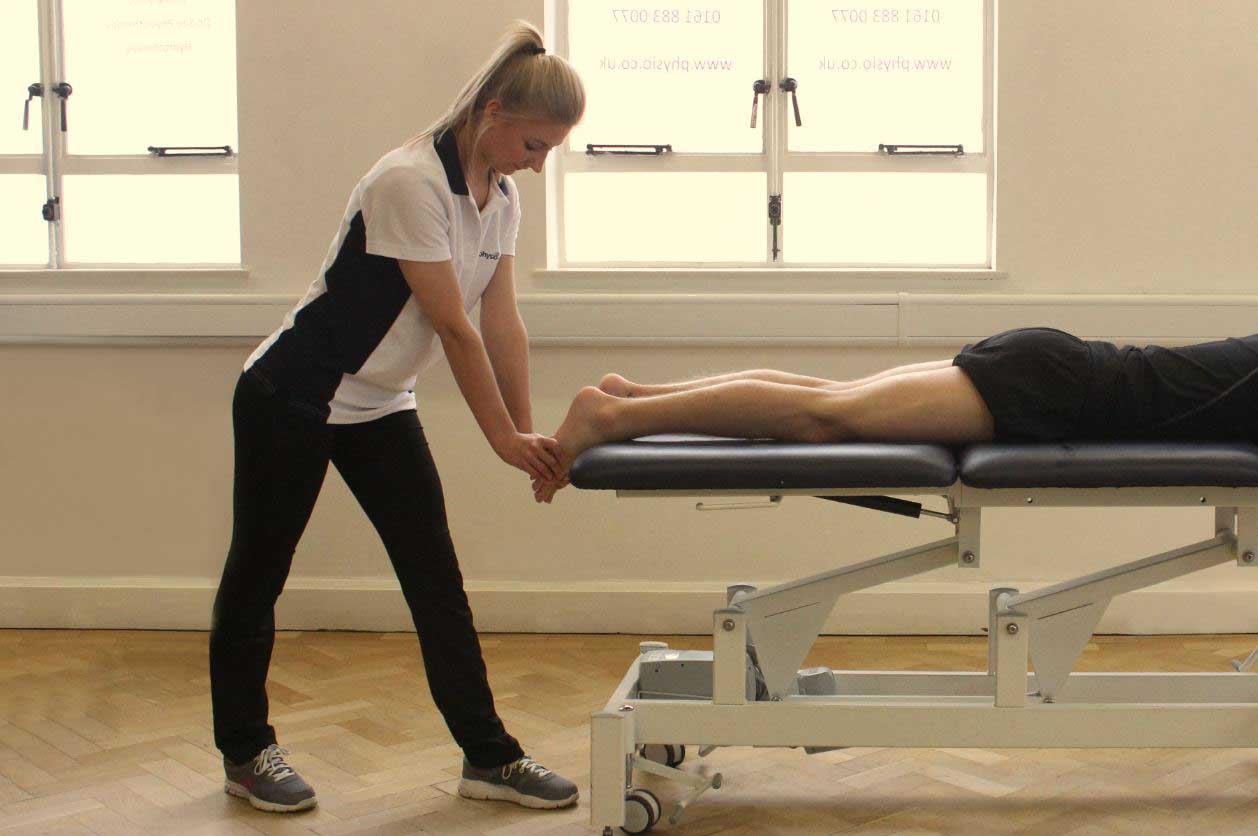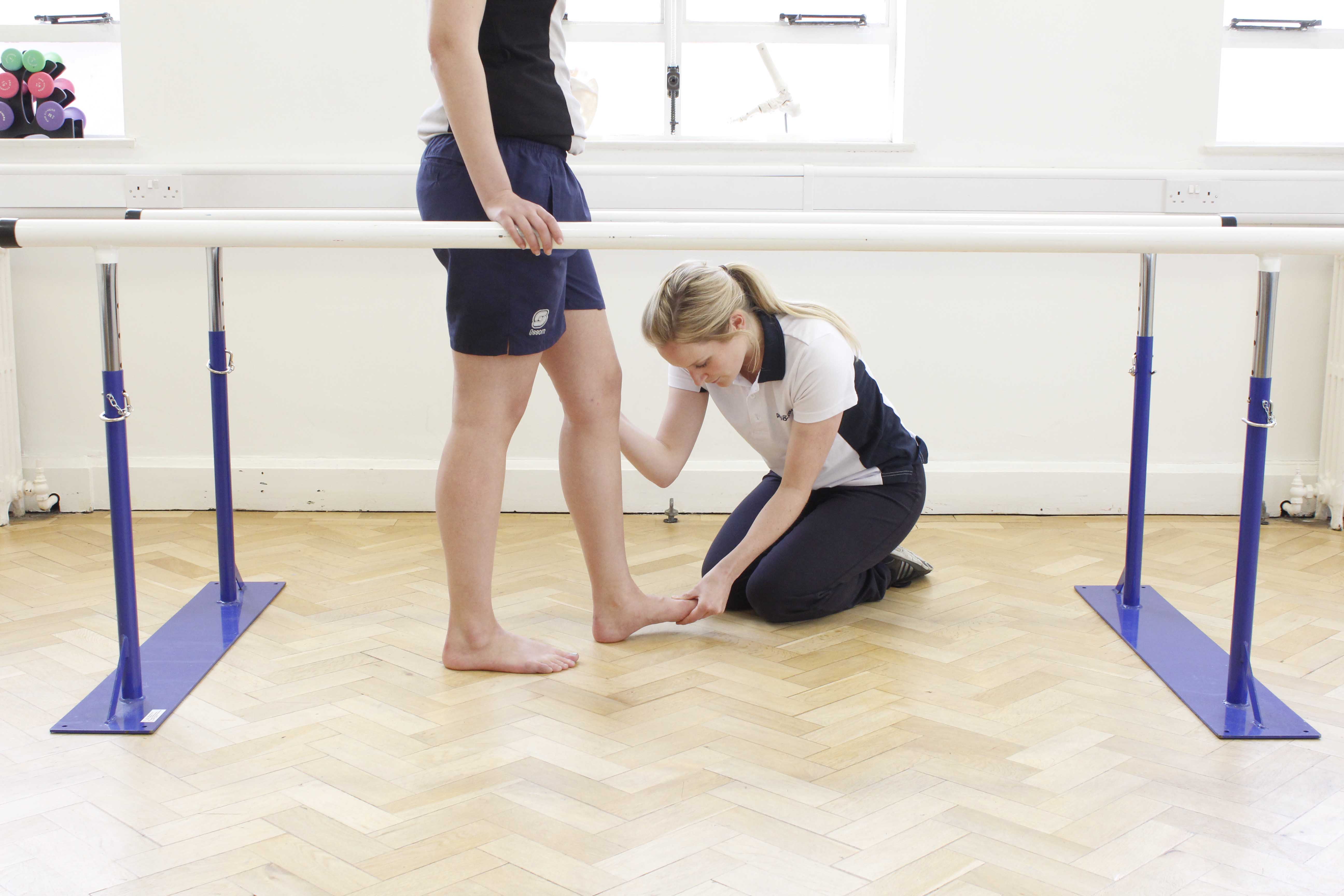What is a Lisfranc Injury?
A Lisfranc injury is named after a French surgeon, Jacques Lisfranc who recognised the injury in 1815.A Lisfranc injury occurs between the bones of the forefoot and the midfoot. A dislocation occurs when the ligaments between the forefoot and midfoot are disrupted. A fracture occurs usually alongside the dislocation the midfoot. The bones that make up the midfoot are the three cuneiform bones, the cuboid and the navicuular.
 Above: Soft tissue massage and mobilisations of the bones and connective tissues in the foot by an experienced therapist
Above: Soft tissue massage and mobilisations of the bones and connective tissues in the foot by an experienced therapistWhat causes a Lisfranc injury?
Lisfranc injuries are caused when extreme force is applied to themidfoot, usually following a road traffic accident or a fall from height. Crush injuries such as dropping heavy objects onto your foot or your foot being run over can also cause this type of injury.
Certain athletes can acquire this injury if their sport involves their foot being held in position by equipment. For example, horse riders, cyclists, snowboarders, kitesurfers and windsurfers all have foot placings or stirrups to hold their feet in position. If a fall happens, the foot often is not removed from their placings, resulting in extreme force being applied to the midfoot region causing a dislocation or fracture.
 Above: Functional exercises for the foot and ankle, guided by an experienced physiotherapist
Above: Functional exercises for the foot and ankle, guided by an experienced physiotherapistWhat symptoms caused by Lisfranc injury can physiotherapy help with?
Symptoms arising from a Lisfranc injury that our physiotherapists can help with include:
- Pain
- Swelling
- Inability to weight bear
- Decreased muscle strength
- Decreased range of movement
- Decreased function
How is aLisfranc injury diagnosed?
A Lisfranc injury is diagnosed by a health professional taking a full subjective and objective assessment of your presenting injury. Depending on the severity of the injury, a foot deformity and disturbance of the skin overlying the site may be present. An x-ray will confirm the suggested diagnosis. If the x-ray is in-conclusive then a MRI scan may be ordered to examine the site of injury further.
Medical treatment of a Lisfranc injury
Medical treatment depends on the severity of the injury. There are three different classifications for a Lisfranc injury. These include:
- Homolateral – involves all five metatarsals being displaced in a lateral direction
- Isolated - involves one or two metatarsals being displaced
- Divergent - metatarsals are displaced in a forwards or backwards direction
Surgery requires the patient going under anaesthetic in order for the surgeon to secure the fracture using internal screws or external pins. Following surgery, the patient is unable to weight bear for six weeks allowing for the fracture to heal.
Non-operative treatment takes place if there is minimal displacement of the bones. Treatment involves a cast being applied for six to eight weeks and for the patient to non-weight bear for this period.
Following medical treatment, physiotherapy rehabilitation is vital to restore function.
Benefits of physiotherapy for a Lisfranc injury
Physiotherapy treatment provides many benefits following a Lisfranc fracture. These include:
- Decreased pain
- Decreased swelling
- Gait (walking) education without the use of aids
- Increase in muscle strength
- Increase in range of movement
- Increase in function
What would physiotherapy treatment for Lisfranc involve?
There are various treatment techniques that our physiotherapists will utilise depending on your presenting symptoms. Physiotherapy treatment should begin shortly after immobilisation and may include:
- Soft tissue massage to decrease swelling
- Strengthening to address post immobilisation weakness
- Flexibility exercises
- Gait training
How do I arrange a physiotherapy assessment for Lisfranc injury?
To arrange a physiotherapy assessment for Lisfranc injury with one of our specialist musculoskeletal physiotherapists then you can please email us at office@liverpoolphysio.co.uk or call us on 0330 088 7800.
Summary
A Lisfranc injury can be a very painful and debilitating injury if correct treatment is not sought after. Our physiotherapists at …………. Have extensive experience in rehabilitating people who have suffered from this type of injury following surgical or non-surgical treatment. In order to let our physiotherapists be regain function please email us at office@............ Or call us on 01……. To book an appointment with one of our specialist physiotherapists.

 0330 088 7800
0330 088 7800





































